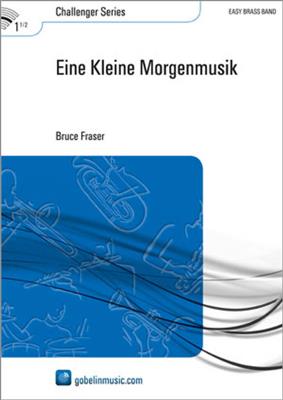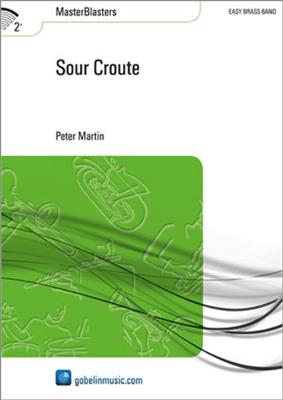Results
-
 £76.99
£76.99New Waves - Torstein Aagaard-Nilsen
New Waves is a special composition. Although contemporary but still attractive to musicians and listeners. Norwegian composer Aagaard-Nilsen has failed in a special way to add new elements to the contemporary wind music. Original exciting rhythms and contrasting harmonies make this composition enjoyable and challenging together. Interrupted by a slow middle section New Waves may be seen as five minutes jazz, rock and funk optima forma! New Waves is een bijzondere compositie. Weliswaar eigentijds maar toch aantrekkelijk voor muzikanten en luisteraars. De Noorse componist Aagaard-Nilsen is er op bijzondere wijze in geslaagd nieuwe elementen toe te voegen aan dehedendaagse blaasmuziek. Oorspronkelijke ritmes en spannende contrastrijke samenklanken maken het spelen van dit werk plezierig en uitdagend tegelijk. Onderbroken door een langzaam middendeel kan New Waves beschouwd worden als vijf minuten jazz, rock en funk optima forma!
Estimated dispatch 5-14 working days
-
 £69.99
£69.99Nocturne - Torstein Aagaard-Nilsen
Commissioned by Manger School Band and their conductor (at that time) Bj?rn Sagstad in 1990. He wanted a calm, slow piece of music. Nocturne means 'night music'. It does not reflect a particular dream, but the feeling you get when you?re day-dreaming: you are in the middle of beeing awake and asleep. Geschreven in opdracht van Manger School Band en hun dirigent (op dat moment) Bj?rn Sagstad in 1990. Hij wilde een rustig, langzaam stuk muziek. Nocturne betekent 'nacht muziek'. Het gaat dus niet een bepaalde droom, maar het gevoel dat je krijgt wanneer je aan het dagdromen bent: je bent in het midden van wakker zijn en slapen.
Estimated dispatch 5-14 working days
-
£60.99
Pastorale - J.G. Brouwer
A sonorous work with a pastoral atmosphere. This composition is not based on a Christmas song, but fits very well in the program of a Christmas concert! drum-part ad lib.
Estimated dispatch 5-14 working days
-
 £60.99
£60.99A Sentimental Song - Marten Miedema
A simple melody, with accompaniment in blue, becomes a wonderful expressive piece. There are opportunities for improvisation, but the indicated solos have been composed. Select your favourite instrument and soloist, or will all soloists be featured? Enjoy playing and listening to A Sentimental Song!
Estimated dispatch 5-14 working days
-
 £54.99
£54.99Variations on a French Folksong - John DeBee
Qu'est ce que c'est? The most famous French folksong, but now in curious varieties and some of them sometimes almost unrecognizable.
Estimated dispatch 5-14 working days
-
 £54.99
£54.99Onward!
A brief history: Pentecost Monday was a special day for schools in Yorkshire (England). There were a variety of activities. The pupils of Sabine Baring-Gould would meet with the children of a nearby village. It seemed like a good idea that during the walk would be sung. But she could not find a suitable song and decided to write one by herself. "Onward Christian Soldiers" was the result. It soon became very popular, though she herself was not entirely satisfied with the rhyme scheme. The melody used (St. Gertrude) was by the famous English composer Sir Arthur S. Sullivan. Back to now: Gawan Roberts, has given the hymn a proper update. He gave the still popularsong a solid rock beat and added daring harmonies. So it's popular, for current generations, again for years. Onward!
Estimated dispatch 5-14 working days
-
 £54.99
£54.99Eine Kleine Morgenmusik - Bruce Fraser
An "unintended" play on words on the title of Mozart's famous composition forms the basis of this solo piece. It was composed in 2004 by the Scottish composer, Bruce Fraser, and features a solo for flugel or cornet. It is not a very difficult piece for both the soloist and the band, but is that always necessary? A lovely, highly recommended intermezzo for your concert.
Estimated dispatch 5-14 working days
-
 £54.99
£54.99Sour Croute - Peter Martin
Eating is a feast. But you are not yet in a party mood? Then enjoy Sour Croute because that will make you move. This German waltz will certainly put you into the right mood.
Estimated dispatch 5-14 working days
-
 £54.99
£54.99Soldiers Song - Patrick Millstone
As long as we can remember, trumpets and percussion have been the instruments most closely associated with the army and its soldiers. Just think of the medieval herald who publicly proclaimed all the king's important announcements. This work opens with a festive fanfare which immediately calls for your attention. No tidings of disaster, but a festive parade of soldiers passing by while whistling merrily. This idea was the composer's starting point when writing this cheerful little piece.
Estimated dispatch 5-14 working days
-
£60.99
Old Paintings - Patrick Millstone
The composer depicts five little paintings which were hanging on the wall of the spare room of his grandparents' house when he used to stay there as a young boy. Each painting had its own place and story. Even a replica of Rembrandt's Night Watch was there and his eyes were always focussed on the person with the drums. Imaginative music of high educational value. Playing together, articulation, and playing in tune are familiar, but useful, ingredients of this varied piece.
Estimated dispatch 5-14 working days
